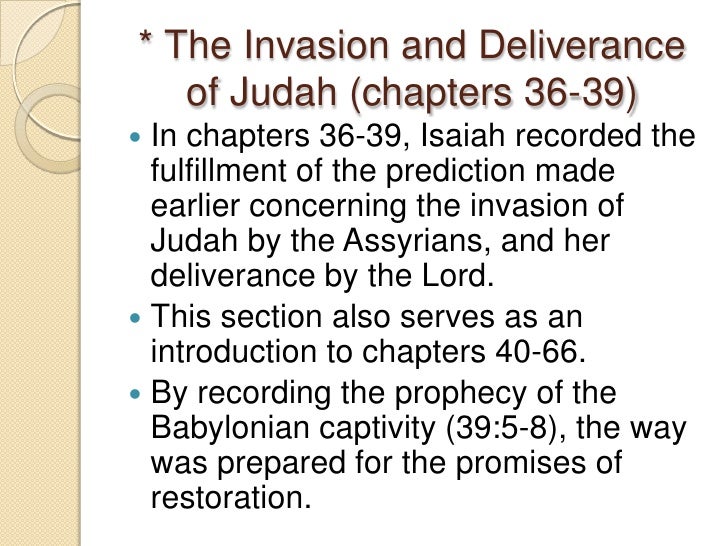Isaiah 36-39
"Now, Lord our God, deliver us from his hand, so that all the kingdoms of the earth may know that you, Lord, are the only God" (Isa 37:20, NIV).
On whom are you depending (Isa 36:5)? Whom are you trusting? Where is your trust ultimately being placed? The entire book of Isaiah forces us to ponder these fundamental questions again and again. Isaiah 36-39, in particular, expresses and presses this question which is absolutely central to the total message of Isaiah. The context of Isaiah 36-37 is in 2 Kings 18-19, and in particular 2 Ki 18:13-16. The Assyrian king, Sennacherib, had apparently accepted Hezekiah's submission and a monetary satisfaction (300 talents of silver and 30 talents of gold), but immediately renewed his pressure on Jerusalem.
References:
- Historical Transition: God Alone is Man's Only Hope (Isaiah 36-39). Though Hezekiah was a "good" king, only God is our King and ultimate hope. My daily bread Dec 2010.
- Isa 36-39 (paralleled in 2 Ki 18:13-20:19) is the historical narrative bridge between the mostly poetic Isa 1-35 and Isa 40-66. Isa 36,37 are the historical consummation of Isa 1-35--Jerusalem's deliverance from Assyria (proving through Hezekiah that faith in God is met with his blessing)--and Isa 38,39 provide the context and the historical basis for Isa 40-66--a preview of the Babylonian captivity due to Hezekiah's folly and vanity. Against the backdrop of divine faithfulness (Isa 36,37) and human inconstancy (Isa 38,39), God stands forth as the only hope of his people.
- Webb, Barry G. The Message of Isaiah. 147-159.
- The enemy at the gates (36:1-22).
- The tables turned (37:1-38).
- The power of God's word (1-13).
- Hezekiah looks up (14-20).
- Sennacherib's fall (21-38).
- Hezekiah's illness (38:1-22).
- Envoys from Babylon (39:1-8).
- Motyer, J. Alec. Isaiah. 247-272.
- The first Assyrian embassy: the helpless king (36:1-37:7).
- The second Assyrian embassy: the godly king (37:8-35).
- The finale: Assyrian overthrow (37:36-38).
- Hezekiah and the way of faith: the decisive sin (38-39).
- One prayer, two answers (38:1-8).
- Death and life (38:9-22).
- The moment of decision (39:1-8).
- 50 sermons on Isaiah by Ray Ortlund.
- In Whom Do You Now Trust? (Isaiah 36:1-37:7)
- That All the Kingdoms of the Earth May Know (Isaiah 38:8-38).
- ESV Gospel Transformation Bible. Isaiah 36–39 largely corresponds with 2 Kings 18–20. Isaiah's ministry has warned of compromises and temptations, and now we reach a climax in the narrative: will King Hezekiah trust in Yahweh or will his fear of a threatening political force cause him to lose faith in the God of Israel? Though the circumstances differ, the battle of the heart remains the same for us today.


No comments:
Post a Comment